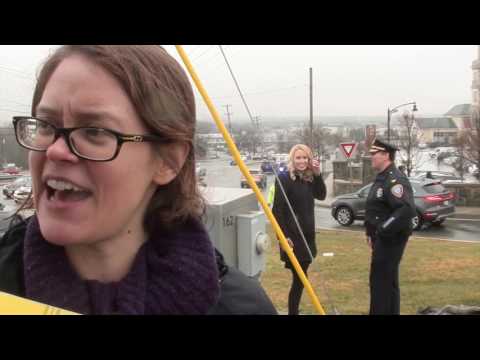Judge dismisses all charges in 2017 Cranston panhandling case
“I hope that this outcome – and the monetary cost associated with it – dissuades other municipalities from enacting measures like this one, which are cruel, short-sighted, and based on stereotypes and political rhetoric, not facts,” said Megan Smith, a social worker with the House of Hope CDC. “Instead of trying to criminalize those who are very poor, we should be focused on creating affordable housing and building diverse and inclusive communities.”
August 16, 2021, 11:05 am
By Steve Ahlquist and Homeless Bill of Rights Defense Committee
Last Thursday the City of Cranston officially dismissed the charges against six activists who were ticketed for engaging in “roadway solicitation” in 2017. This public demonstration – which highlighted the injustice and irrationality of the ordinance and its discriminatory impact against people experiencing homelessness – precipitated a lawsuit filed by the ACLU challenging the ordinance. This lawsuit was settled in favor of the ACLU in April of this year, when United States District Court Judge William Smith entered a consent judgment declaring the ordinance unconstitutional and barring the city from enforcing it. As part of the settlement, the City has paid the ACLU and its cooperating attorneys $140,000 in reimbursement for legal fees.
On February 15, 2017, the City of Cranston passed an ordinance entitled “Solicitation of Roadways Prohibited” that basically banned a person from entering or standing in a roadway or median for the purpose of distributing anything to, or receiving anything from, the occupant of a motor vehicle.
To challenge the passage of the ordinance, advocates took to the sidewalk and medians of Cranston on March 27, 2017 to protest the new ordinance and to stand in solidarity with those who panhandle to survive. The action was organized by the Homeless Bill of Rights Defense Committee, made up of numerous legal, community and non-profit organizations, which joined together after the 2012 passage of the state’s Homeless Bill of Rights to ensure successful implementation of the new law. That day six activists were ticketed, and it set off the legal challenge that ended in today’s official dismissal of the cases.
Steve Ahlquist, reporting for RI Future, was there to cover the protest and the subsequent ticketing by Cranston Police Officers:
“It felt surreal to watch numerous police cars respond to a few people handing out flyers,” said Duff Morton, one of the former defendants, remembering the day of his arrest. “There were more officers than I could count. They stopped us from talking to drivers, and they very politely gave us tickets. One of the longest traditions in this nation is the protection of each person’s right to speak in public, whether or not someone else likes what that person has to say. You don’t give up that right just because you’re poor. You don’t give up that right for any reason at all.”
The Rhode Island Chapter of the ACLU argued successfully that the measure infringes on the constitutional rights of Rhode Islanders and would inadvertently impact others such as firefighters engaging in their long-standing “Fill the Boot” campaigns. It would prohibit school teams, cheerleaders and non-profit groups from making use of this long-recognized method of obtaining needed financial support, something such groups have done for years in Cranston.
In June of 2012, homeless prevention and affordable housing advocates celebrated the passage of landmark legislation making Rhode Island the first state in the country to enact a “Homeless Bill of Rights” formally banning discrimination against Rhode Islanders experiencing homelessness and affirming their equal access to housing, employment and public services.
The Rhode Island law asserts that Rhode Islanders experiencing homelessness have the right to use public parks, public transportation and public buildings, “in the same manner as any other person and without discrimination on the basis of his or her housing status.”
“This outcome represents a significant success in ensuring that people can exercise their free speech rights to meet their survival needs,” said Megan Smith, a social worker with the House of Hope CDC and another of those whose charges were dismissed today. “I hope that this outcome – and the monetary cost associated with it – dissuades other municipalities from enacting measures like this one, which are cruel, short-sighted, and based on stereotypes and political rhetoric, not facts. Instead of trying to criminalize those who are very poor, we should be focused on creating affordable housing and building diverse and inclusive communities.”
The Homeless Bill of Rights Defense Committee, the group that organized the action in 2017, is currently undertaking an audit of the municipal codes of each city and town in Rhode Island with the intention of identifying and advocating for the repeal of ordinances that similarly violate the civil rights of those who are poor and homeless.
“We hope to use the outcome in Cranston to catalyze our efforts to do away with criminalizing ordinances in other cities and towns,” said Barbara Freitas, a third former defendant and the director of the Rhode Island Homeless Advocacy Project, “Our folks on the street are depending on us to help them when injustice occurs. And we will!”







